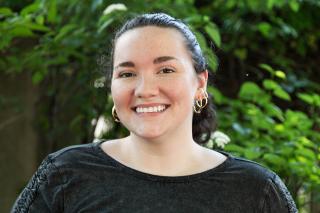Since she majored in Social Work at Simmons, Erin Curley has supported vulnerable individuals in her community. In her current role, she’s helping others engage as well by connecting Northeastern students with community service opportunities in Boston and beyond. Curley spoke with us about her career, why she chose Simmons, and the importance of embracing care and compassion.
Tell us about your current role.
I am the Assistant Director of Community Service Programs within the Office of Community Service and Civic Engagement at Northeastern University. I oversee two main programs: the Alternative Breaks Program and the Community Volunteers Program.
Participants in the Alternative Breaks Program go on weekend or week-long trips focused on self-reflection and community work. Recently, a group of students camped at Saguaro National Park [Arizona], and another group worked alongside a medical brigade in the Dominican Republic. This year, I oversaw thirteen trips, engaging around 120 students and 10 staff members.
For the Community Volunteers Program, I work with our community partners to place students in a semester-long service commitment within a local non-profit organization. Our students are especially active in the Roxbury, Mission Hill, Fenway, and South End neighborhoods. We offer a range of placements so that anyone feeling called to service can find the right fit for them.
All of these programs have an asset-based approach. We enter into other communities with the intention to support them, yet we respect the fact that locals are the experts in how to meet their own needs. Therefore, our students work against a “savior complex,” thinking that they are going to save people. We are really just there to learn and to support the work locals are already doing and, in most cases, have been doing for a long time.
How did you become interested in this field?
When I went to Simmons, I knew that I wanted to study Social Work. Given the nature of this field, we took a lot of classes with a service-learning component or field placement. In fact, first-year Social Work majors at Simmons are required to complete 40 hours of service-learning, whereas second-year students must complete 80 hours of service-learning. Some courses have service-learning built into their very structure. With the support of my Social Work professors, I completed 40 hours of service during my first year at Dana-Farber Cancer Institute and over 80 hours of service at the Boston Area Rape Crisis Center. I know what it’s like to be a student deeply engaged in the community, and it only feels right that it is now central to my career.
Why did you choose to attend Simmons?
I am a first-generation college student, so I applied to Simmons on a whim. It soon became my top choice. Simmons was the first school that made me feel that they wanted me to attend, while other schools implied that I was lucky to get accepted. I felt that Simmons actually read my application, and staff from admissions would call me and try to get to know me as a person. When I attended a campus visit, I felt affirmed in my decision.
How did Simmons prepare you for your profession?
I was confident and outspoken in high school, but once I came to Simmons I realized that I still had so much room for growth. Simmons created a space for me to be challenged and to step up in formative ways. When I originally applied to college, I was not seeking out a women-centered college, but I now understand how critical this experience was for me.
Simmons also taught me the power of having a strong network, and now I get to encourage Northeastern students to find their own ways of engaging in community. At Simmons I learned how to be vocal and a strong advocate for myself and for members of my community, and this has served me well.
What is most rewarding about your work?
Educating students on the history of higher education institutions and their responsibilities to local communities is where I see the biggest shift in how they engage in volunteering. I have the unique position of working with such diverse students—ranging from those at the undergraduate and graduate levels, those new to service or experienced leaders, and everyone in between. Modeling community relationships that are reciprocal and intentional is embedded throughout my work with students, colleagues, and community partners.
What advice do you have for current students who wish to pursue a similar path?
You are a lot more qualified than you realize. Sometimes the field of higher education can request a lot of experience in terms of years, positions, and so forth, but the programming I did at Simmons definitely prepared me for what I do now. There are so many leadership and work-study positions at Simmons, so you just need to find a way to integrate this experience into your professional identity. If you demonstrate care and compassion, those values will resonate widely within the field of higher education and beyond.

